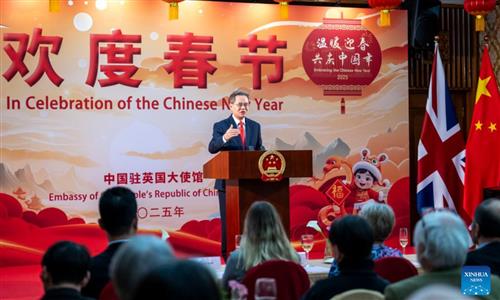
Illustration: Xia Qing/GT
On May 23, the documentary film The Sinking of the Lisbon Maru premiered in London to an audience of nearly 200 Chinese and British guests. Three days earlier, a 1.8-meter-tall, 1000kg memorial was unveiled on Qingbang Island in Zhoushan, East China's Zhejiang Province. The monument commemorates the rescue of British prisoners of war (POWs) onboard the sunken Lisbon Maru, a Japanese liner, by the local Chinese community in October 1942, a legendary epitome of the camaraderie between the Chinese and British peoples and their sacrifices fighting the fascists during WWII.
Today, the memorial features tightly clasped hands - one belonging to a Chinese fisherman weathered by toil and the other to a British soldier scarred by the ordeal. Above them an inscription reads, "Love knows no boundary; Friendship transcends time." Fresh flowers and aged photographs placed in front recount a shared memory never to be forgotten.
In October 1942, the Japanese military commandeered the Lisbon Maru to secretly transport over 1,800 British POWs from Hong Kong to Japan. Sailing without POW markings - a clear breach of international convention - the vessel was mistaken for a warship by a US submarine near Zhoushan and was subsequently sunk by a torpedo attack. As a result, 843 POWs perished. Survival seemed all but impossible for the rest, given the frigid waters. Yet Chinese fishermen, braving Japanese gunfire, made 65 perilous trips in 46 small boats - saving, sheltering, and nursing 384 survivors back to health against all odds, despite severe shortages of food and medicine. "Those who have experienced storms and waves understand how precious life is," the fishermen often say. Despite language barriers and racial differences, 83 years ago, those fishermen did not hesitate to save the British POWs. Even though they didn't know who they were rescuing, they acted on their instinctive respect for life and a shared resolve to resist the Japanese aggressors. Their pristine humanity shone as a beacon in those dark days for mankind.
In a reply letter to Denise Wynne, daughter of the last surviving Lisbon Maru POW, in 2022, President Xi Jinping pointed out that the touching story of heroic fishermen from Zhoushan, Zhejiang coming to the rescue of British prisoners of war on board the Lisbon Maru in 1942 is an important testimony to China and the UK fighting shoulder to shoulder as allies against fascist aggression during World War. It is also a historical episode epitomizing the profound friendship forged between the people of our two countries.
Similar stories abound. Twenty-four Chinese naval students joined D-Day operations, and were commended by prime minister Winston Churchill. Michael Lindsay (second Baron Lindsay of Birker) braved Japanese blockades to deliver medical supplies and radios to Chinese resistance forces. British sprinter and Olympic champion Eric Liddell, whose stories inspired the Oscar-winning movie Chariots of Fire, was born in Tianjin and devoted his life to Chinese education and sports before passing away in a Japanese internment camp. British journalist George Hogg founded the Bailie School in Shaanxi Province, sheltering hundreds of war orphans. These shared memories remain vivid to this day.
WWII claimed approximately 70 million lives. From the ruins of war came the UN and multilateralism, along with mankind's vow of "never again." Now, 80 years later, the international order confronts the challenges of protectionism, geopolitical conflicts and unilateral bullying. International treaties have been abandoned, global institutions withdrawn from, and the multilateral trading regime trampled.
As we commemorate the 80th anniversary of victory in World Anti-Fascist War, the memorial on Qingbang Island serves as a stark reminder that forgetting history invites its repetition. "Our descendants are accessible to visit and remember ancestors' sacrifices and the rescuers' bravery," Denise Wynne remarked tearfully at the unveiling ceremony. Lucy Powell, the UK Labour Party Leader of the House of Commons, agreed that "This tragedy should be remembered." One message resonates throughout: Peace requires eternal vigilance. In today's turbulent world, upholding the correct historical perspective on WWII, preserving the post-war international order, and deepening global cooperation are imperative, not optional.
From Zhoushan's fishing boats to Normandy beaches and Bailie School's playground, we are reminded that peace is not a given - it is earned through courage and unity. Despite the decades that have passed, the story is as moving as ever, and the same is true for our yearning for peace, friendship and solidarity. Challenges may vary, but the solution remains the same.
The author is a Beijing-based scholar. opinion@globaltimes.com.cn

